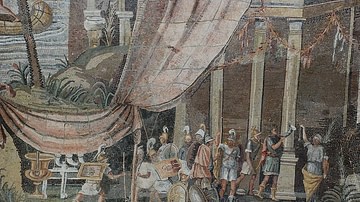
Ptolemaic police, or phylakitai, were responsible for law enforcement throughout Ptolemaic Egypt. The existence of a professional police force made Egypt different from ancient societies like the Roman Empire, which had no police. In addition to preventing, solving, and punishing crimes, Ptolemaic police guarded state property and helped transport valuable goods like grain.
Police wielded almost total power within their local jurisdictions and were not subject to oversight in their day-to-day operations. This lack of oversight contributed to severe corruption that affected all levels of ancient Egyptian society. Petitions from civilians reveal complaints about police committing thefts and assaults with impunity. Police also shirked their duties and colluded with criminals. The royal government attempted to eliminate corruption through legislation but was mostly ineffective at preventing it.
Origins
Following Alexander the Great's conquest of Egypt in 332 BCE, it was ruled by the Greek Ptolemaic dynasty. This dynasty kept much of Egypt's administrative system intact, so Ptolemaic law enforcement bore many similarities to the earlier functions of police in ancient Egypt. In ancient Egypt, the pharaoh was the ultimate authority on justice. It was the pharaoh's duty to uphold ma'at, the concept of cosmic order and balance. This system continued in the Ptolemaic period. Theoretically, anyone could petition the Ptolemaic king and queen for judgment. For practical reasons, most criminal proceedings were presided over by judges. During the Ptolemaic period, Egypt was divided into provinces called nomes. Royally appointed judges presided over the nomes and acted in the pharaoh's authority.
At the local level, there was a twin system of courts specializing in either Greek or Egyptian law. The Egyptian courts (laokritai) were presided over by Egyptian priests, while the Greek courts (chrematistai) were run by Greek officials. This division of legal authority was necessary since the vast majority of Egypt's people were native Egyptians, but the ruling dynasty was Greek, and hundreds of thousands of Greeks immigrated to Egypt. Generally, Egyptians pursued justice through the Egyptian courts, while Greeks went to the Greek courts. The Ptolemaic dynasty had no desire to create a unified national judicial system. Instead, it focused on strengthening the enforcement of pre-existing laws, especially those related to the collection of taxes and control of economic activity. The will of the courts was enforced by military and police forces.
Organization
Ptolemaic Egypt was bilingual, and the government used both the Egyptian word "kalasiries" and the Greek word "phylakitai" for police officers. The word "phylakitai" is related to the Greek word "phylax", meaning a guard or watcher. "Kalasiries" was derived from "gl-ˇsr", an ancient Egyptian term for a soldier. The epistates phylakiton, equivalent to a police commissioner, supervised all police activity in the nome. These commissioners typically answered to royal officials, including governors and ministers. A chief of police, or archiphylakitai, was in charge of policing their town or city. Beneath them were the rank-and-file phylakitai, whose job it was to solve crimes and enforce the law. Different officers might be armed with equipment like swords, spears, or whips depending on their needs.
Police were considered part of the Ptolemaic army, and were given money and allotments of farmland in exchange for service. During wars, they could be called up to serve overseas as porters, foot soldiers, and naval officers. Up until the late 3rd century BCE, low-ranking infantry, called machimoi, were used to reinforce police in Egypt. Because police officers were lower ranking than regular infantry and cavalry, they received less compensation. A police officer might receive 10 arouras of land, while a foot soldier was given 20 or 30 arouras. Cavalry might receive up to 100 arouras, owning farms ten times the size of police.

By the 2nd century BCE, the Ptolemaic Kingdom had begun to lose its military supremacy. After suffering continuous defeats by enemies like the Seleucid Empire, it was no longer able to muster large, well-trained armies. At the same time, rebellions and civil unrest forced the Ptolemaic dynasty to expend more resources on internal security. Because of this, the government began to take land previously allotted to cavalry and divide it into smaller allotments for police officers.
Duties
The basic mandate of police in Ptolemaic Egypt was to keep the peace, protect property, investigate crimes, and arrest criminals. Police were frequently stationed around vulnerable places like major roads, granaries, transport ships, and temples. They also protected important officials when they traveled around the country in the course of their duties. Certain forts along the border between Upper Egypt and Meroë were garrisoned with police to discourage raids and banditry.
Police commonly responded to reports of crime and disturbances in their jurisdiction. Victims of crimes could seek out police directly or file reports through professional scribes who wrote down and passed along their petitions. These petitions were typically written on papyrus and stored in government archives. Because of Egypt's hot, dry weather, many of these papyri did not rot and have survived into modern times. They are an important source of information for modern historians who study Ptolemaic Egyptian law.
To Zenon, greetings, Teos. While I was making the journey to Philadelphia, I was attacked by a robber. Later, on a visit to Arsinoë, I found the man who had attacked me and pointed him out to Hermais, the police chief there. Please write a letter to Hermais so that he may send this person to you, so that I, who have fled to you, may receive justice. Farewell.
(P. Cair. Zen. 2 59224, trans. Bauschatz)
Typical investigations were carried out by rank-and-file police officers focused on gathering witness testimony and physical evidence that could prove suspects had committed a crime. They had the right to detain suspects indefinitely and could confiscate items or seal off property if they felt it was important for their investigation. If an investigation became complicated or important enough, police coordinated their efforts with higher-ranking military and civilian officials.

Ancient petitions also reveal a more mundane side to police work in ancient Egypt. Civilians might even go to the police to help them track down lost animals and settle disputes between neighbors. At other times, police might be tasked with delivering mail or overseeing the transportation and sale of grain during the harvest season. Most police officers served in their hometowns and were familiar with its residents. A large proportion of Ptolemaic police were native Egyptians, unlike other parts of the Ptolemaic army which were mostly made up of Greek immigrants.
Sentencing & Punishment
Suspects were often imprisoned while they awaited sentencing. Letters written by prisoners reveal the stark, brutal conditions in ancient Egyptian prisons. Complaints about lack of food and clothing were common, and prisoners often became sick during their incarceration. Jails were primarily used to temporarily detain suspects awaiting trial, and criminals were not generally sentenced to imprisonment as a punishment. Most civil disagreements were resolved through financial compensation. Those found guilty of an offense often paid a fine and were ordered to pay restitution to the aggrieved party. More serious crimes were often punished with a beating or whipping. The police were typically responsible for flogging convicted criminals.
Those who committed more serious offenses might be sentenced to hard labour. Criminals were often sent to work in mines and quarries, which were known for their physically demanding and dangerous working conditions. Imprisoned miners dug tunnels with hand tools and sought out veins of precious minerals. Those in the tunnels worked in darkness, breaking the stone with picks and hammers. Overseers often flogged their workers to motivate them to work harder. The goldmines of Egypt's eastern desert were partly staffed by prisoners, and their output was used to finance the Ptolemaic military and the ruling dynasty's hedonistic expenses.
Those who have been condemned in this way – and they are a great multitude and are all bound in chains – work at their task unceasingly both by day and throughout the entire night, enjoying no respite and being carefully cut off from any means of escape; since guards of foreign soldiers who speak a language different from theirs stand watch over them, so that not a man, either by conversation or by some contact of a friendly nature, is able to corrupt one of his keepers.
(Diodorus Siculus, Library of History, 3.12.3, trans. Oldfather)
Convicted criminals were rarely sentenced to death, as capital punishment was reserved for only a few serious offenses like treason. Modern historians are unsure whether premeditated murder was punished by execution in the Ptolemaic period. Homicide was a capital offense in Egypt during the Dynastic period, and it was also a capital offense in most of Classical Greece. Although Ptolemaic legal documents do not explicitly state that murderers were sentenced to death, it is very likely. Officials could also subject criminals and suspects to torture.
Corruption & Injustice
Corruption and abuses of power were rampant in Ptolemaic Egypt because police were empowered to act with almost total autonomy. They typically operated without oversight from other branches of government, making it difficult for misconduct to be reported and prevented by civil officials. It was also difficult for police from different jurisdictions to communicate quickly and coordinate their efforts, leading to mistakes and confusion. This situation meant that police often committed crimes like stealing property from civilians or extorting them for bribes. Local governmental officials also sometimes used police as their personal enforcers so that they could abuse and intimidate civilians.
Those who resisted police abuses risked brutal retaliation. Records of petitions reveal complaints from people who were threatened, beaten, or tortured by police. The threat of violence and intimidation made it difficult for fair trials to be carried out when police corruption was involved. Other victims of corruption were prevented from receiving any trial at all. Innocent people were sometimes wrongfully imprisoned for months or even years due to corruption. Some of these people were held in jails, and others were detained on private properties owned by officials. Those falsely accused of crimes might try petitioning the king or queen, who could intervene to ensure that they received justice.
Neither the strategoi nor any others who are in charge of the Crown, State or sacred interests may arrest any one for a private debt or offence or owing to a private quarrel and keep him imprisoned in their houses or anywhere else on any pretext whatever; but if they accuse any one, they shall bring him before the magistrates appointed in each nome, and shall receive or give satisfaction in accordance with the decrees and regulations.
(Amnesty Decree of 118, translation courtesy of APIS)
Dereliction of duty was also a common issue in Ptolemaic Egypt. Corrupt police colluded with criminals to evade capture and hold onto stolen goods. Some police officers also illegally ignored or sheltered deserters from the army and navy of Ptolemaic Egypt. The practice of forcibly conscripting Egyptian men into military service meant that desertion was common, and police were supposed to be responsible for detaining and reporting any runaway sailors that they encountered.
The royal government attempted to rein in corruption through edicts focused on punishing officials who abused their power or shirked their duties. One of the most significant pieces of anti-corruption legislation was the amnesty decree of 118 BCE, passed during the reign of Ptolemy VIII, Cleopatra II, and Cleopatra III. The decree condemns various abuses committed by local officials, including false imprisonment, theft, and extortion. However, the Ptolemaic judicial system continued to suffer from these issues throughout its history.
Disbanding under Roman Rule
After Ptolemaic Egypt was conquered by the future Roman emperor Augustus (r. 27 BCE to 14 CE) in 30 BCE, the phylakitai were disbanded along with the rest of the Ptolemaic military. Like most ancient civilizations, the Roman Empire never had a dedicated police force, as it was not considered a necessary expense. Instead, law enforcement duties were delegated to the Roman army officers stationed throughout the provinces. Some villages and cities organized local guards to handle some police duties. In Rome, the city watch was called the vigiles, and their primary duty was firefighting. The villages of Roman Egypt similarly organized their own watches to protect them. These village guards were typically paid very little and did not have the same sweeping powers as the phylakitai.







